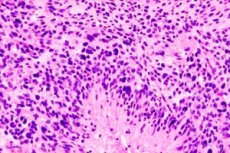Nye publikasjoner
Ny mRNA-basert kreftvaksine utløser en sterk immunrespons mot ondartet hjernesvulst
Sist anmeldt: 02.07.2025

Alt iLive-innhold blir gjennomgått med medisin eller faktisk kontrollert for å sikre så mye faktuell nøyaktighet som mulig.
Vi har strenge retningslinjer for innkjøp og kun kobling til anerkjente medieområder, akademiske forskningsinstitusjoner og, når det er mulig, medisinsk peer-evaluerte studier. Merk at tallene i parenteser ([1], [2], etc.) er klikkbare koblinger til disse studiene.
Hvis du føler at noe av innholdet vårt er unøyaktig, utdatert eller ellers tvilsomt, velg det og trykk Ctrl + Enter.

For første gang har forskere ved University of Florida gjennomført en klinisk studie på mennesker, som viser at mRNA-kreftvaksinen deres raskt omprogrammerer immunforsvaret til å angripe glioblastom, den mest aggressive og dødelige typen hjernesvulst.
Resultatene av studien med fire voksne pasienter bekrefter lignende resultater oppnådd hos 10 hunder med naturlig forekommende hjernesvulster, hvis eiere samtykket til deltakelse fordi det ikke fantes andre behandlingsalternativer. Gjennombruddet vil nå bli testet i en klinisk fase I-studie med barn med hjernekreft.
Funnene, som er publisert i tidsskriftet Cell, representerer en potensiell ny måte å utnytte immunforsvaret til å bekjempe vanskelig behandlelige kreftformer ved hjelp av en modifisert mRNA-teknologi og lipid-nanopartikler som ligner på COVID-19-vaksinene, men med to viktige forskjeller: bruk av pasientens egne tumorceller til å lage en personlig vaksine, og en ny, sofistikert leveringsmekanisme inne i vaksinen.
«I stedet for å injisere enkeltpartikler, injiserer vi klynger av partikler som vikler seg rundt hverandre som en pose med løk», sa seniorforfatter Elias Sayur, MD, PhD, en pediatrisk onkolog ved UF Health som utviklet den nye vaksinen. I likhet med andre immunterapier «trener» vaksinen immunforsvaret til å gjenkjenne svulsten som et fremmedlegeme.
"Blant de mest imponerende funnene var hvor raskt den nye metoden, administrert intravenøst, fremkalte en kraftig immunrespons for å avstøte svulsten," sa Sayur.
"På mindre enn 48 timer kunne vi se at disse svulstene gikk fra en 'kald' tilstand (med svært lite immuncelleaktivitet) til en 'varm' tilstand (med en svært aktiv immunrespons)."
Glioblastom er en av de mest ødeleggende diagnosene med en median overlevelse på omtrent 15 måneder. Standardbehandling inkluderer kirurgi, strålebehandling og en kombinasjon av cellegift.
Den nye publikasjonen er et resultat av syv års forskning, som startet med prekliniske musemodeller og deretter en klinisk studie på 10 hunder med terminal hjernekreft, utført med eierens samtykke i samarbeid med UF College of Veterinary Medicine.
Etter å ha behandlet kjæledyrhunder med personlige mRNA-vaksiner, gikk Sayurs team videre til en liten, FDA-godkjent klinisk studie for å sikre sikkerhet og testgjennomførbarhet før de utvidet til en større studie.
I en kohort på fire pasienter ble genetisk materiale kalt RNA ekstrahert fra hver pasients fjernede svulst, og mRNA ble deretter amplifisert og pakket inn i høyteknologiske biokompatible lipid-nanopartikler for å få tumorcellene til å «se» ut som et farlig virus når de ble introdusert i blodet igjen og utløse en immunrespons. Vaksinen ble personlig tilpasset for hver pasient for å få mest mulig ut av deres unike immunsystem.
«Å demonstrere at det å lage en mRNA-kreftvaksine på denne måten fremkaller lignende og robuste responser hos mus, kjæledyrhunder med naturlig forekommende kreft og menneskelige pasienter med hjernekreft er en virkelig viktig oppdagelse», sa Duane Mitchell, MD, PhD, direktør for UF Clinical and Translational Research Institute og UF Brain Tumor Immunotherapy Program og medforfatter av artikkelen.
Selv om det er for tidlig å vurdere de kliniske effektene av vaksinen, levde pasientene enten sykdomsfrie lenger enn forventet eller levde lenger enn forventet.
De 10 kjæledyrhundene overlevde i median 139 dager, sammenlignet med en typisk median overlevelse på 30–60 dager for hunder med denne tilstanden.
Neste steg, med støtte fra FDA og CureSearch for Children's Cancer Foundation, vil være en utvidet klinisk fase I-studie med opptil 24 voksne og barn for å bekrefte resultatene.
Når den optimale og trygge dosen er bekreftet, vil rundt 25 barn delta i fase II.
«Jeg håper dette kan bli et nytt paradigme for behandling av pasienter, en ny plattform for å modulere immunforsvaret», sa Sayur.
Sayur og Mitchell har patenter relatert til vaksinen som er i ferd med å bli lisensiert av iOncologi Inc., et bioteknologiselskap dannet ved UF.
